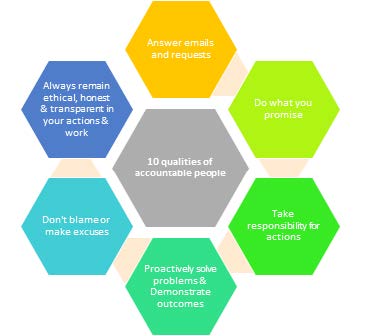 Michele du Plessis
Michele du Plessis
With the rolling out of the entrepreneurial revolution, it became apparent that “accountability and responsibilities” are not always understood and practised. It was also noticed that it is not only the forprofit businesses that are feeling the brunt of the Covid-19 pandemics’ impact but are felt by individuals, families and especially non-profit organisations.
Accountability can be defined as follows:
“True accountability is fully owning everything that happens in your life. It means you understand that you are responsible for your attitude, actions, reactions, teamwork, communication, and relationships. It also means you hold others accountable for the commitments and effort they give forth.”
Accountability is important in all spheres of life.
To be accountable eradicates the time and effort you spend on diverting activities and other unproductive behaviour. When you make people accountable for their actions, you are effectively teaching them to value their work. When done right, accountability can increase your team members’ skills and confidence. We apply accountability in our lives by holding you accountable to the list of actions required to fulfil your objective and set a time limit for each task. It reminds you when action steps are not completed and achieved by deadline dates.
This keeps you on the path toward achieving your long-term goal. Unfortunately, taking responsibility is very difficult. When there’s an environment of punishing mistakes, people are less willing to be open about mistakes, take accountability to fix them and learn from them. When people don’t feel they are going to succeed and they don’t feel they’re going to get support, it’s too risky to take accountability.
If you are an entrepreneur and you’re not accountable you won’t manage your clients’ expectations. By owning up to your mistakes you can start to analyze what went wrong and never repeat the same mistake. As part of being forthright and taking ownership of issues, you need to tell your clients how you will set things right. If you happen to be in a leadership role, accountability carries even more weight. In leadership roles, accountability is the acknowledgement and assumption of responsibility for actions, products, decisions, and policies including the administration, governance, and implementation within the scope of the role or employment position and encompassing the obligation to report, explain and be answerable.
Accountability in the context of public service means being answerable to the public for any decision, act or omission. I.e. public scrutiny. It is necessary to ensure objectivity in decision making and ensure the trust and faith of the citizens in public office. Because MP’s (Members of Parliament) are elected representatives, they must be accountable to the people of South Africa and they must act in the public interest. Parties are elected on the strength of what they stand for, and party MP’s should be able to explain what they have been doing to carry out their duties. “With great power comes great responsibility,” is a very popular proverb. It is also known as the Peter Parker Principle, referring to Spider-Man comics written by Stan Lee.
Being in public service means that transparency and accountability are required to the extent to which public office holders can be effectively held accountable and responsible for their actions. Transparency refers to conducting activities or performing actions openly and clearly. Accountability refers to being responsible for one’s actions and having the ability to provide sound reasoning for actions. In the Journal of Public Administration, Vol. 48, No.2, authors E.O.C. Ijeoma and A.M. Sambumbu in the article “A framework for improving public accountability in South Africa” wrote:
“In the absence of a comprehensive public accountability framework, achieving effective public accountability remains increasingly a challenge for most of South Africa’s government departments. It is on that basis, that this paper provides reflections on public accountability in South Africa with the motive of postulating a comprehensive framework that can be used to enhance accountability across South Africa’s government departments. The study is motivated by the fact that public accountability in the South African public service is hinged on discrete and uncoordinated mechanisms which render coherency, efficiency and effectiveness of public accountability almost impossible. It is postulated in this article that the effectiveness of any public accountability framework is measured by three constructs; the core essentials in public accountability, use of a balanced combination of public accountability measures, and constant monitoring and evaluation of positive effects of public accountability on governmental performance. In South Africa, there is a history of governments not being accountable and responsible for their actions. Transparency is also in short supply and the public need to take responsibility to hold public servants accountable for their actions.
The Guide to Government accountability and public participation clearly states:
“The relationship between government and citizens is very important. Ultimately government is accountable to citizens for decisions taken – at a macro level, at a community level and an individual level. At a macro level, public accountability is exercised through oversight by public representatives in the legislative arm of government. At a community level, the government should consult and involve communities in discussions about projects and programmes that directly affect them. At an individual level citizens have the right to hold the government to account for, and get reasons for government decisions that directly affect them.” Public participation is one of the cornerstones of our democracy and benefits all equally. Let us take the responsibility for our own and our governments’ accountability to build a better future for all.
